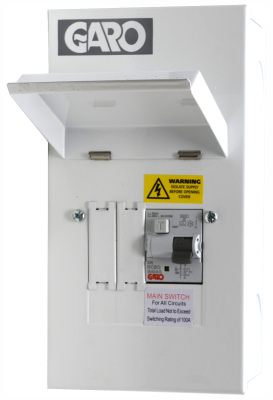The Role of Consumer Units in Effective Power Administration Solution
Consumer systems are indispensable to reliable energy monitoring systems, offering as the key circulation points for electric power within frameworks. The arrival of smart modern technologies has additionally enhanced their functionality, allowing for real-time data tracking and nuanced power usage analysis.
Recognizing Consumer Devices

Recognizing the role of consumer devices starts with identifying their essential function in guarding electrical systems. By isolating faults within particular circuits, consumer systems prevent widespread interruptions and prospective fire threats. This seclusion is achieved with the use of breaker that trip or merges that strike when a mistake is detected, thus removing the electrical circulation to the affected circuit.
Additionally, consumer systems assist in the orderly circulation of power, improving the performance of energy usage. They permit for the systematic management of electric lots, which can be particularly important in industrial and industrial setups where demand can vary significantly. Correctly kept consumer devices contribute to the longevity of electrical systems and assist in lessening downtime triggered by electric failings, ultimately supporting the seamless operation of energy-dependent centers.
Smart Technologies Combination

An essential benefit of wise customer devices is their capacity to utilize progressed formulas and equipment understanding for predictive analytics. This permits preemptive changes based on usage patterns, weather report, and various other variables, considerably raising overall performance. Furthermore, clever consumer units assist in demand action programs, where power usage can be dynamically changed throughout top durations to maintain the grid and reduce expenses.
The combination of renewable resource sources, such as solar and wind, is likewise structured with wise customer devices. By intelligently managing the intermittency of these sources, these devices ensure a balanced and reliable energy supply. Furthermore, wise customer devices boost customer involvement by giving in-depth insights and remote control capabilities with mobile applications, cultivating an extra positive approach to energy conservation and sustainability.
Monitoring Power Intake
Building on the capabilities of wise innovations assimilation, checking energy intake becomes a crucial emphasis within energy monitoring systems. By leveraging advanced metering framework (AMI), real-time data on power usage can be collected at granular levels, offering useful insights right into consumption patterns and peak need durations.
Smart meters and Web of Points (IoT) devices play a crucial function in this surveillance procedure. These gadgets can track power use in real-time, sending information to centralized systems for evaluation. The accumulated information is from this source then refined via sophisticated formulas to identify anomalies, anticipate future intake, and suggest optimization strategies. Furthermore, cloud-based remedies provide scalable platforms for saving and analyzing large datasets, promoting remote surveillance and control.
The combination of these modern technologies not only empowers consumers with in-depth information about their energy usage yet also supports utility suppliers in handling tons his response circulation extra properly. Eventually, continual and specific surveillance is important for accomplishing energy effectiveness, price financial savings, and sustainability objectives within power management systems.
Optimizing Home Appliance Use

One effective technique entails identifying peak and off-peak hours to change energy-intensive activities, such as washing or dishwashing, to times when power demand is lower. This not only decreases pressure on the grid yet additionally maximizes lower energy tolls. Additionally, integrating equipment learning formulas enables for predictive maintenance, making sure home appliances operate at optimal performance and prolonging their life-span.
Power management systems can also include user-specific preferences and actions to tailor device usage schedules. Clever lighting systems can readjust brightness based on tenancy and all-natural light accessibility, while Heating and cooling systems can keep comfort degrees without too much power usage.
Supporting Sustainability
Promoting sustainability within power management systems entails not only boosting efficiency however also cultivating environmentally accountable techniques. Consumer devices are essential to this procedure, as they give real-time information and control systems that make it possible for individuals to check and lower their power consumption. By leveraging sophisticated modern technologies, consumer units can determine energy-saving possibilities and help with the combination of renewable resource sources like solar and wind power.
One vital facet of advertising sustainability is educating customers on the advantages of responsible energy usage. Via comprehensive understandings offered by customer devices, individuals can make enlightened decisions that decrease their carbon impact. As an here are the findings example, these systems can advise ideal times for running high-energy appliances based upon grid need and renewable resource schedule, therefore lowering dependence on nonrenewable fuel sources.
Furthermore, customer devices sustain the fostering of smart grid innovations, which enhance the overall efficiency and reliability of energy distribution. By enabling two-way communication between customers and energy providers, these systems can dynamically adapt to power demands, decreasing waste and promoting using lasting energy techniques.
Verdict
Consumer devices, as indispensable elements of energy management systems, dramatically improve electrical security and efficiency within structures with circuit protection and clever innovation combination. Real-time information tracking and analysis facilitated by these devices enhance energy usage and appliance use. Furthermore, the incorporation of eco-friendly energy sources promotes sustainable methods, adding to lowered general energy consumption and lower carbon footprints. Customer systems play an essential function in progressing both energy performance and environmental sustainability.
Breakthroughs in wise modern technologies have transformed the capacities of energy administration systems, specifically through the combination of wise consumer systems.Structure on the capacities of clever innovations assimilation, keeping an eye on power intake becomes a crucial focus within energy administration systems.Efficient home appliance use optimization is an essential component of power monitoring systems, aiming to enhance efficiency and reduce unnecessary energy consumption.Consumer devices, as integral components of energy management systems, considerably improve electrical security and effectiveness within buildings through circuit protection and clever innovation combination. Furthermore, the incorporation of eco-friendly power resources advertises sustainable practices, adding to lowered total power consumption and reduced carbon impacts.